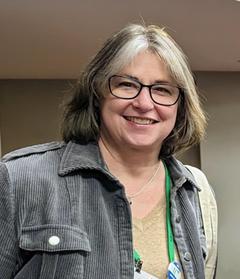 |
|
| Lanora Jennings at Winter Institute | |
Lanora Jennings is director of the Bookseller Oral History Project, which has begun collecting interviews with current and former booksellers about their historical experiences, insights, and perspectives, and will be a part of a new archive on the history of bookselling at the University of Iowa Libraries Special Collections and Archive. Here she talks about the powerful stories she's heard so far.
When I was a bookseller, I often would think of the Charlie Brown comic in which Lucy would open her booth: "Psychiatric Help, 5¢. The Doctor is In." Customers, brows furrowed, would pull me aside: "We just had to say goodbye to our dog. Do you have any books for our kids?" "I just found out I have cancer. What can I read that will take me to another world?" "My grandmother is in hospice. Do you have anything I can read out loud that would comfort her?" Part of the power of books is that they are medicine for the soul. And part of booksellers' job is prescribing the right book. This interaction requires a bookseller to create a space where their customer feels safe, and to be an active and empathetic listener.
This past month, I've been listening to booksellers. During Winter Institute, 27 booksellers sat down to record their stories. Since then, I have conducted 10 more interviews with many more scheduled. My motivation for this project was an academic one: to create an archive that preserved the history and culture of bookselling told by the booksellers themselves. What I did not anticipate was how much booksellers needed to tell their stories. Booksellers listen to their customers, but who listens to them?
During the very first recording, my throat constricted, and the tears just started flowing. The young woman told a powerful story of how she is honoring the legacy of her mother through her store. I thought, "Wow! What an incredible start... but they all won't be like that." I hit play on the next one. And the next one. And then I had to stop. I just couldn't handle any more that day.
It's been a month, and I've listened to only half of the stories. I am savoring them, letting them sit with me while my own emotions process what I have heard. I've sobbed and laughed; I've cheered and been frustrated. There are threads that connect each story. I hear in all the booksellers' voices a deep love and respect for the power of books to create community. Many speak with such authentic passion and even awe at this vocation they have dedicated themselves to. But there is also an undertone of a deep sense of responsibility... to their staff, their communities, their representation of the ideas on their shelves. Their bookseller origin stories varied widely yet all found themselves at home in a community of other booksellers.
I am deeply grateful for every bookseller that sat down in front of that microphone and shared their stories with such candor and grace. The work that booksellers do is often underappreciated and unacknowledged. Once the world hears their stories, that will not be the case for long. Listening to these voices clearly reveals booksellers as the heroes they really are. For all booksellers and former booksellers reading this: my microphone is ready. The bookseller listener is IN.
Soon, I will begin to post these stories on the website for everyone to hear. In the meantime, I will leave you with a few anonymous (for now) quotes:
"All along in my career, bookselling was always kind of that mainstay, but I didn't picture it as my career until I had a mentor who really, to me, is the exemplar of what a bookseller is, just truly devoted to representation on the shelf, to the written word, to helping people find themselves in a story, to continuing to be creative and engaging with not just the readers and the shoppers, but the people who work there."
"I became a bookseller because it's a place of people and books and that alchemy between them. And I think that's a very unique place to be in the structure of life, of written words, the alchemic intersection between ideas and people and that ability to megaphone things, but also that ability to listen and read what a person might need and then have a treasure trove in your brain of all the potential books that might speak to it or touch it or hold whatever they need."
"And for us, just the way in which some communities are considered food deserts, we feel that communities without bookstores are considered knowledge deserts. So, we are based in... a historically black community that for a long time didn't have any bookstores in it. And we wanted to be right in the epicenter of what we felt was a knowledge desert... and to be able to bring knowledge to folks because that is as important of a source of feeding as food is. That is what was needed... knowledge is as needed as food."
"There's a lot of moments that have impacted me and made me feel proud about the work we're doing. And that's why I say I'm a book activist, because I know the inertia and the change that I've helped. And I didn't know I was doing that, but the impact made that difference, and I didn't even know. So, I'm very grateful and thankful that I'm in this industry because it is making a change for the next generation."

